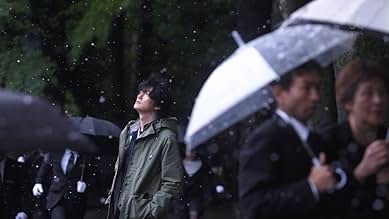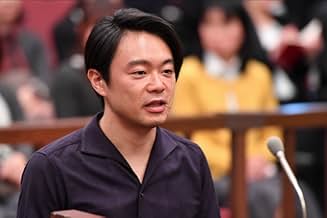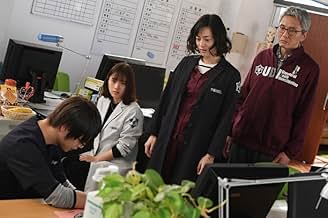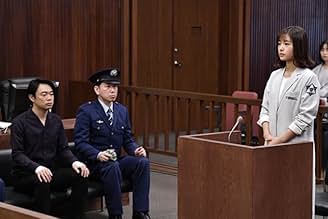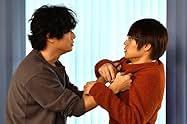CALIFICACIÓN DE IMDb
8.1/10
2.6 k
TU CALIFICACIÓN
Historias de una organización no gubernamental japonesa que trabaja en casos de muertes no naturales y trata de revelar la verdad detrás de las muertes.Historias de una organización no gubernamental japonesa que trabaja en casos de muertes no naturales y trata de revelar la verdad detrás de las muertes.Historias de una organización no gubernamental japonesa que trabaja en casos de muertes no naturales y trata de revelar la verdad detrás de las muertes.
Explorar episodios
Opiniones destacadas
In Japan a new department called Unnatural Death Investigation carries out autopsies on people who have died under suspicious circumstances. The main star of the series is Mikoto Misumi (Satomi Ishiihara) whose family died when she was a child in tragic circumstances. She works alongside another forensic investigator who was a suspect in his girlfriend's death many years earlier and is bitter and twisted. Alongside this dynamic we see the work of the team as they investigate strange and unusual deaths and how they struggle to find the cause. I found it an enjoyable series with interesting side characters and good acting with just a hint of gore which I was thankful for taking into account their job. I was surprised to learn how few autopsies are actually carried out in Japan and how this seems to be accepted the population.
Unnatural - Was it the first non-anime Japanese drama I ever watched? I'm not entirely sure~
It tells the story of a group of forensic pathologists at Japan's newly established Unnatural Death Investigation Institute (UDI).
Unlike novels, TV dramas don't give you room for imagination. But through visual storytelling (no mental effort required) and synchronized audiovisuals (like the theme song Lemon by Kenshi Yonezu), combined with tightly paced plotting (one standalone case per episode, ten episodes in total), it grips your heart firmly.
This is a detective-mystery genre that Japanese creators excel at, but its ambition goes beyond that.
Suicide organizations, wealth disparity, labor conflicts, family dynamics, school bullying, the role of media-all these are themes explored in the series.
Death is the ultimate question of life's journey.
Aside from this show, another death-themed piece I watched this year was the film The Breaking of the Hell, which, like "Unnatural" , uses death to reflect the chaos and struggles of the living world-those deep questions we often ponder at night.
The ending of this drama responds to a question (or perhaps an answer) that has lingered in my mind for over a decade:
Is the result more important, or the process? Is it acceptable to achieve one's goals by any means necessary?
Of course, the story still delivers a happy ending after choosing the right path. But I know all too well that the real world is often far more complicated. More often than not, what we observe is that "the noble ones have their epitaphs, while the wicked hold their passes."
So, when truly faced with a cruel moment of choice, do we still possess the courage to refuse unprincipled means?
It undoubtedly carries the aura of a masterpiece. After watching it, I personally believe it's well-deserved.
The convictions it upholds, the moments of being loved-all strike a genuine chord.
It tells the story of a group of forensic pathologists at Japan's newly established Unnatural Death Investigation Institute (UDI).
Unlike novels, TV dramas don't give you room for imagination. But through visual storytelling (no mental effort required) and synchronized audiovisuals (like the theme song Lemon by Kenshi Yonezu), combined with tightly paced plotting (one standalone case per episode, ten episodes in total), it grips your heart firmly.
This is a detective-mystery genre that Japanese creators excel at, but its ambition goes beyond that.
Suicide organizations, wealth disparity, labor conflicts, family dynamics, school bullying, the role of media-all these are themes explored in the series.
Death is the ultimate question of life's journey.
Aside from this show, another death-themed piece I watched this year was the film The Breaking of the Hell, which, like "Unnatural" , uses death to reflect the chaos and struggles of the living world-those deep questions we often ponder at night.
The ending of this drama responds to a question (or perhaps an answer) that has lingered in my mind for over a decade:
Is the result more important, or the process? Is it acceptable to achieve one's goals by any means necessary?
Of course, the story still delivers a happy ending after choosing the right path. But I know all too well that the real world is often far more complicated. More often than not, what we observe is that "the noble ones have their epitaphs, while the wicked hold their passes."
So, when truly faced with a cruel moment of choice, do we still possess the courage to refuse unprincipled means?
It undoubtedly carries the aura of a masterpiece. After watching it, I personally believe it's well-deserved.
The convictions it upholds, the moments of being loved-all strike a genuine chord.
I went into this not expecting too much. The premise was interesting but didn't feel new. I am very glad to be fully wrong about my initial thoughts and expectation.
Unnatural was a very engaging series filled with mystery, great character chemistry, superb acting & very genuine interaction between the characters. I absolutely loved the way the characters bantered and joked with each other. It felt very real and not forced.
The mystery and crime solving kept me glued to the screen. I binged the entire 10 episode in 2 days and really wanted more.
Honestly a great series and I really wish there were more episodes.
Unnatural was a very engaging series filled with mystery, great character chemistry, superb acting & very genuine interaction between the characters. I absolutely loved the way the characters bantered and joked with each other. It felt very real and not forced.
The mystery and crime solving kept me glued to the screen. I binged the entire 10 episode in 2 days and really wanted more.
Honestly a great series and I really wish there were more episodes.
Japanese shows are becoming more and more like western shows were they seem to have a need to be lecturing you about a social issue rather than telling you a story or engage you emotionally. This one is not a bad one worth a watch Satomi is not so versatile but shed does a OK job. Stories are not bad, so worth a watch. In response to the reviewer who turns the drama review to a social commentary, please leave political and social comments out of here, if we wanted to get into that we would watch a documentary, (why do some women have to turn everything into being independent makes me think these women intrinsically feel weak so they need to keep talking about it!)
The unnatural death of a corpse sets off a series of reverses, combining suspenseful suspense with intriguing social questions.
She is economically independent, internally free and honest. Isn't she what many of us girls want to be today? It is more necessary to learn how to be independent and open-minded than to learn how to dress and make up. In particular, the phrase "a good meal and a good night's sleep are better than time for despair" can almost be regarded as a panacea. Anyway, when I saw this sentence, I felt a sharp blow in my heart. Life, the time wasted in confusion, despair and loneliness, there is no need, this time is really not as good as a good meal, a good sleep, give yourself a good reward.
¿Sabías que…?
- TriviaFrom the same fictional universe as MIU 404 which follows two detectives solving crimes.
Selecciones populares
Inicia sesión para calificar y agrega a la lista de videos para obtener recomendaciones personalizadas
- How many seasons does Unnatural have?Con tecnología de Alexa
Detalles
- Tiempo de ejecución54 minutos
- Color
Contribuir a esta página
Sugiere una edición o agrega el contenido que falta

Principales brechas de datos
By what name was Unnatural (2018) officially released in India in English?
Responda
